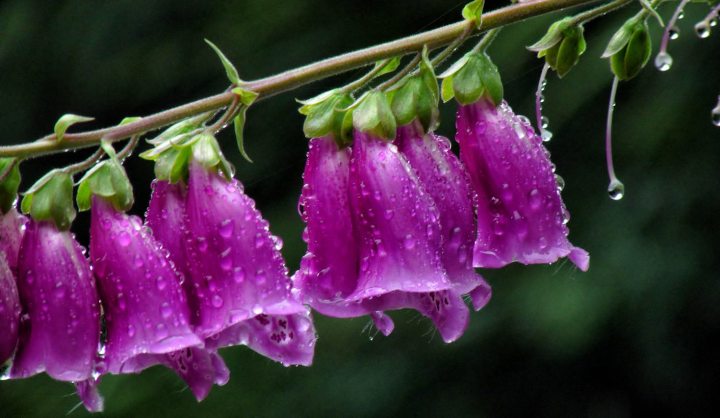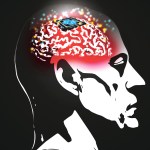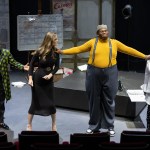Maverick Life
2017, First Thoughts: Towards a Government of Poets

If poetry is taught at all, we are taught to read poets in isolation from each other – and in isolation from the politics of all time. Poetry is a badly neglected branch of politics, writes MARK HEYWOOD.
In Britain every year, a day in late September or early October is declared to be National Poetry Day. Last year it fell on October 6. That day, a BBC radio station dedicated a whole day of programing to poetry! By chance, I happened to be driving across England that day. While I was listening, a discussion about a new book that dissects the British poetic tradition pricked my ears. A few months later, over the December holiday period, I found time to make its 600-page traverse. `
We British: The Poetry of a People is about and quotes extensively from 15 centuries of British poetry. It is not nationalistic. It is “British” because it is of and about poetry that was written by people on British soil (yes, I know that is a contested notion and so does the book’s writer); poetry of an ever-changing people. Immigration and national identity are among its themes. Similar studies could and should be undertaken of other national poetries, including ours. They should be, but our Minister of Arts is sleeping on guard, or, to be fair, he has other more pressing engagements in protecting Number 1.
Get the book and then give thanks to the writer, Andrew Marr, for cutting a path of sorts through it all.
Marr is a well-established political journalist. Some might think this makes him inappropriate and odd to be the author of a book on poetry. It’s not because Marr recognises that the essence of poetry is that it is the means for expression of people(s) struggling to find or give meaning to the deepest conundrums of our existence.
In truth, poetry is a badly neglected branch of politics.
To compound the problem, to the extent that poetry is taught at all (and by God it should be), we are taught to read poets in isolation from each other – and in isolation from the politics of all time. Instead, Marr lines his poets up chronologically. By doing so he makes it easier for the reader to appreciate how people who write poems have been labouring with the same basket of values and emotions from time immemorial.
Time may change the way issues present themselves, it may change the landscape, it may clutter human experience with gadgets and technologies.
But it does not alter the issues.
Reading Marr was a tonic for this time-trooper. The poetry Marr yielded up seemed an antidote to my growing unease about how anti-human, soulless and sympathy-less modern government seems to the plight of the human being – at least its ballooning multimillioned poor. Self-perpetuating justifications for the misery and harm governments either create or turn a blind eye to are the cynical stock of modern state “craft”.
Reading Marr (or more accurately reading approximately 200 poets he quotes) coincided with having time to reflect on a historic changing of the guards we are witnessing.
If April is the cruellest month then January is ever the month for prophesy and prediction. This year, very few caring people do not enter 2017 with a sense of trepidation. This trepidation is not just about our lives or our country, South Africa. It extends to the state of the globe as a whole. One US commentator on Sky News said, in passing, that the best thing that could happen for Americans would be just “surviving Trump”.
This implicitly recognises that there is a possibility of not surviving him…
After witnessing Donald Trump’s first press conference as President-elect on January 11 I know what she meant. Be afraid…
Reading the political pundits seems to confirm a consensus that we are at the end of an era – one that has not been kind to the planet or most of the planet’s people. But the era whose cusp we sit on already seems darker, meaner, more macho; brooding, brutal and primed for destruction.
So, if you thought the century of warring ideologies was bad, hold onto your seats. For we are now entering the time of the Big Men. If you thought neoliberalism, the last great binge of shallow capitalists, was nasty and mean, get ready for brute force.
Get ready for macho men with narrow tunnel visions, pragmatists of pure self-interest, uncivilised men.
Trump, Putin, Modi, Xi Jinping are the punks for the powerful. They are men who make a virtue of being anti-nuance. Behind and beside them are a string Despicable Me’s – Assad, Erdogan – and wannabe big-man minions, like our own Jacob Zuma.
Zuma must have loved Trump’s display of contempt for the media and all detractors at his press conference. Out, vile accountability!
Whether you are already living in the midst of a maelstrom of hate, or not, we are at greater risk now of being back on a path to planetary destruction and catastrophe. This is not being alarmist. It is evident in statistics, particularly concerning unchecked climate change. These crises may take some time to turn into catastrophe, but that is the trajectory on which our star is firmly fixed.
People frame their fears about the near future in different ways, depending on who they are. Left intellectuals like Yanis Varoufakis, briefly a finance minister in Greece, and others, repeatedly draw parallels with the 1920s, the last few years before Europe was engulfed in fascism and war. His 2016 book And the Weak Suffer What They Must? is essential reading for anybody trying to understand late capitalism and why such huge resentment exists of the elite bureaucrats of Brussels.
Environmental activists like Naomi Klein try to get us to take seriously the evidence of irreversible climate change.
Others point to intractable wars. Others to nascent wars. None of these just happens. The conflicts in the Middle East, capable of much greater combustive power, have been made by years of deceit, manipulation and misgovernance, usually at the hands of developed countries. Ancient societies are unravelling because of things done in the name of democracy – that is, in our name – by governments that have been captured by the global arms industry.
Read Andrew Feinstein’s The Shadow World (or watch his film of the same name) to learn you who really rules the world.
It’s not a pretty picture.
But what should perplex us most, what is most troubling, is that most people – wherever we are – understand that “we the people” are being royally shafted.
How do we rationalise or understand the fact that it’s a tiny minority of our species, less than 1%, who are doing most of the damage? How have we got into a place where the majority (now powered by technology, law, science) seem so utterly powerless against this ravaging minority?
We know it. We denounce it. Tens of millions of us across the globe are involved in efforts to stop it, to slow it, to alleviate and ameliorate it.
But we find we are pissing into a wind of far more force.
***
Back to Marr(s)…
As I asked myself these questions, I felt less and less amenable to the superficial and predictable answers of the change merchants. The two main ideologies of the 20th century, capitalism and socialism, have manifestly failed to pull us back from this dire situation. Yes, the manifestations of this crisis remain in politics, class and the perpetual economic crisis of capitalism. But what we now face is a civilisational crisis; its roots lie at a deeper level than economics, they are in the human condition and psyche.
I suspect that it’s about the choices made several hundred years ago by smaller groups of human beings living in a much smaller world.
The question is whether there is profit in trying to trace the point where the human race entrenched an approach to how it governed itself that, paradoxically, was at heart anti-human?
Midway through Marr’s book I came upon a poem by one Joseph Mather, an industrial worker during the 1780s and 1790s, a “poet” only by virtue of the fact that some of his scribblings have endured through time. Mather wrote a poem called God Save Great Thomas Paine – a parody, a satire, call it what you will – to the tune of God Save the Queen.
Thomas Paine, you should know, was the author of The Rights of Man, a book whose reception tells us a lot about our human race. When it was published in 1791 it immediateky sold over 50,000 copies in its official edition. In those days most novels sold 1,250 copies! That would be equivalent to millions of copies today.
In the words of one historian:
“Paine found both the language and the programme to attract working people to politics, underlining its relevance to their experience of economic hardship. Stopping short of socialism, Paine transformed jurisprudential notions of social obligation – the ‘soft’ right to charity – into a theory of ‘positive liberty’ – the ‘hard’ right to welfare, guaranteed by government and financed by redistributive taxation.”
Reflecting this excitement, Mather’s poem called on people to:
Down aristocracy,
Set up democracy,
And from hyprocrisy
Save us good Lord.
Why should despotic pride
Usurp on every side?
Let us be free:
Grant Freedom’s arms success,
And all her efforts bless,
Plant through the universe
Liberty’s Tree.
It’s easy to turn the page and pass on. However, isn’t it strange that words and questions written 220 years ago seem to challenge us as much today as they did in a smaller pre-technology world of a few tens of millions of people?
On one level the poem is good for a chuckle. But it’s not funny. It dislodges a much deeper issue. Mather was parodying the “real” national anthem, God Save the King, which had been first published 50 years before in 1745. By Mather’s time the national anthem (the first of its kind – another bad omen) had begun to establish itself. But the values it espoused were not human ones, but the values of a segment of the population who, after a long battle, had finally captured the state.
The national anthem made a prayer of slavish obedience, nationalism, blessed the notion that a monarch’s enemies are the people’s enemies, that there are just wars etc. Given that, in the next century, Britain would become the motor of imperialism, these ‘values’ soon became transposed as world values, transplanted onto peoples who lived way beyond the borders of the British.
That’s one reason why I suspect the disorder we face today originated in a system that we put in place to try to order our interactions – and which we have failed repeatedly to defeat or dislodge. It’s a man-made system (I use the word “man” intentionally) with an anti-human logic; it’s an internal combustion mechanism that now combusts us; an order of being that has over time driven human beings further and further away from their own interests.
Yet we continue to embrace it.
By the way, I’m loathe to simply call this system capitalism. That’s too simplistic. Simply declaring an economic system the root of all evil may prove to be the error that has dogged our ability to dislodge it and implement alternatives with alternative values.
This year, 2017, is the 100th anniversary of the Russian revolution, the last attempt to remove the capitalist economic system in toto. We are going to hear a lot about Lenin again. And Marx, as we also approach the 150th anniversary of the publication of his Capital. Give credit, Lenin and his successors were enormously successful in bringing a depraved Russia into modernity. But neither Lenin nor his successors could protect us from the depravations of their own deformed souls. (I know what some of my comrades are thinking as I write this – yes Stalin was a tyrant – but I don’t buy the ‘deformed workers state’ theory as sufficient explanation for the scale of totalitarianism any more; and neither should you. But that’s another discussion….).
So, was it perhaps around Mather’s time that we, the human race, began to tie ourselves to a system of human wrongs – anti-values that would (mis)lead us down the centuries to where we are today?
Was it around this time that we booted out the poets and kicked our highest expectations of life down the road to an afterlife? Did we sub-contract responsibility for human good to a God, rather than keeping the responsibility with ourselves?
In the years since Mather died, state capture and plunder by minorities has become the norm, not the exception. A hundred years of democracy were not enough to free us from an anti-human ethic, largely because the leaders we elected tied themselves to wealth rather than poverty, development rather than underdevelopment, the interests of men rather than women. Poetry was sidelined.
So, in Trump Year 1 (a wake-up scream if ever there was one), the six-billion-person question is where do we start to change this? Or, as Lenin famously wrote, ‘what is to be done?’…
The first thing to understand is that Trump and the Despicable Me’s are our comeuppance. What we have is what we have allowed. Our systems of government are not pre-ordained and they’ve certainly got nothing to do with divinity. To try to overcome your slavish obedience to the abnormal norm, try to contemplate something different.
For example, what if instead of governments of professional politicians we had governments of poets? What if we deliberately elected men and women who are known to defend, celebrate and seek to spread the deepest values of the human being; to protect it from its fears, particularly death?
In our poets are all the emotions we know: love, fear of death, loathing of hypocrisy, value and recognition of beauty, appreciation of human accomplishment, desire for equality, recognition of what is unique about the human species.
Imagine if we asked them to form our governments? There could be a Minister of Love. A Minister of Death. A Minister of Equality. A Minister for the Preservation and Advance of Civilisation. A Minister of Books.
What if we made them our ministers and instructed them to organise our governments around the values they encapsulate? Such a government would organise the laws and institutions for human interactions around love, against hatred; education would be organised to promote a different system of values; markets of exchange could be organised around meeting the need of all humans; the threshold for war might be raised; the arms industry outlawed.
Of course this is but a dream. And poets themselves have no built-in guarantee of values. We have poets in government – but, as slaves to the party line, they turned out to be rascals. Thabo Mbeki, imagined himself as a philosopher-king, but proved capable of terrible cruelty to people with AIDS. But that’s not the point: the point I am trying to make is about the necessity for the restoration of values and establishing morality as the centre of government.
That, you must understand, will not happen before “we the people” (that’s you by the way) demand it.
Marr ends his journey by quoting from Brand New Ancients, a poem by Kate Tempest, a young woman whose poetry is thumping, pumping, elegantly rude, irreverent and relevant. Tempest asks:
…how can we explain the way we hate ourselves,
the things we’ve made ourselves into,
the way we break ourselves in two,
the way we overcomplicate ourselves?
She laments that “we’ve forgotten we are much more than the sum of all
the things that belong to us”.
Read that again, please.
The title of Tempest’s poem – Brand New Ancients – says precisely what I’ve been trying to convey in this article: Our deepest concerns and instincts are ancient – even while each one of us is brand new: “we are permanently trapped between the heroic and the pitiful”.
And so, as we stare down 2017, as we return to more “mundane” matters like grinding inequality, state capture, AIDS and alcoholism, the Zuptas, what is the connection?
For me it’s this. It’s time to change, and it’s not too late. In fact, in South Africa, we have a better chance than many. We may be pissed off but we are free. We may be poor, but the liberation struggle gave to citizens a power that still must be tested. Our Constitution is still the Supreme Law. Its stated aim is “to free the potential of each person”. It embodies the values of poets. It ratchets love, dignity, equal worth and respect to our land.
In much the same way as The Rights of Man and the Universal Declaration of Human Rights were written in the aftermath of periods of unimaginable depravity, our Constitution seeks to protect and advance values that had been trampled upon in the 300 years before democracy.
But it’s only as strong as you are. It is imperilled by your inaction. If the Constitution is to survive it needs urgently to become a guide to living – not just a guide to law. It needs to be a guide for business, not just government. For you, not just your neighbour.
So, as we consider the worrying state of civilisation in 2017 and what we can do to influence it, we could do nothing better this year than live and work to defend and advance it.
That shouldn’t mean just forming little circles of like-minded people, self-satisfied elites of the politically correct (Trumpism is the answer to that), but contesting and standing up for these values in every aspect of our daily lives, in every encounter, until they start to spread and incrementally gather influence and impact.
In this less than brave new world, activists have to stop being their own self-satisfied elites.
Marr offers a brilliant insight about some poetry. He says “it takes the small and, by staring at it hard, unpacks the big within it”. One of the lessons I am beginning to understand about change is that it starts small: in you, your human values (first, whether you have them and then whether you live them; I suggest you check), in your communities. Change doesn’t need to await the overthrow of capitalism. In fact, Marx would probably tell you that what he envisaged in the 19th century probably won’t happen in the 21st. It can start small and accumulate exponentially.
Ultimately your life and our world depend on it. DM

















 Become an Insider
Become an Insider